I'm no businessperson, but it seems to me that the name of your establishment should answer more questions than it raises:
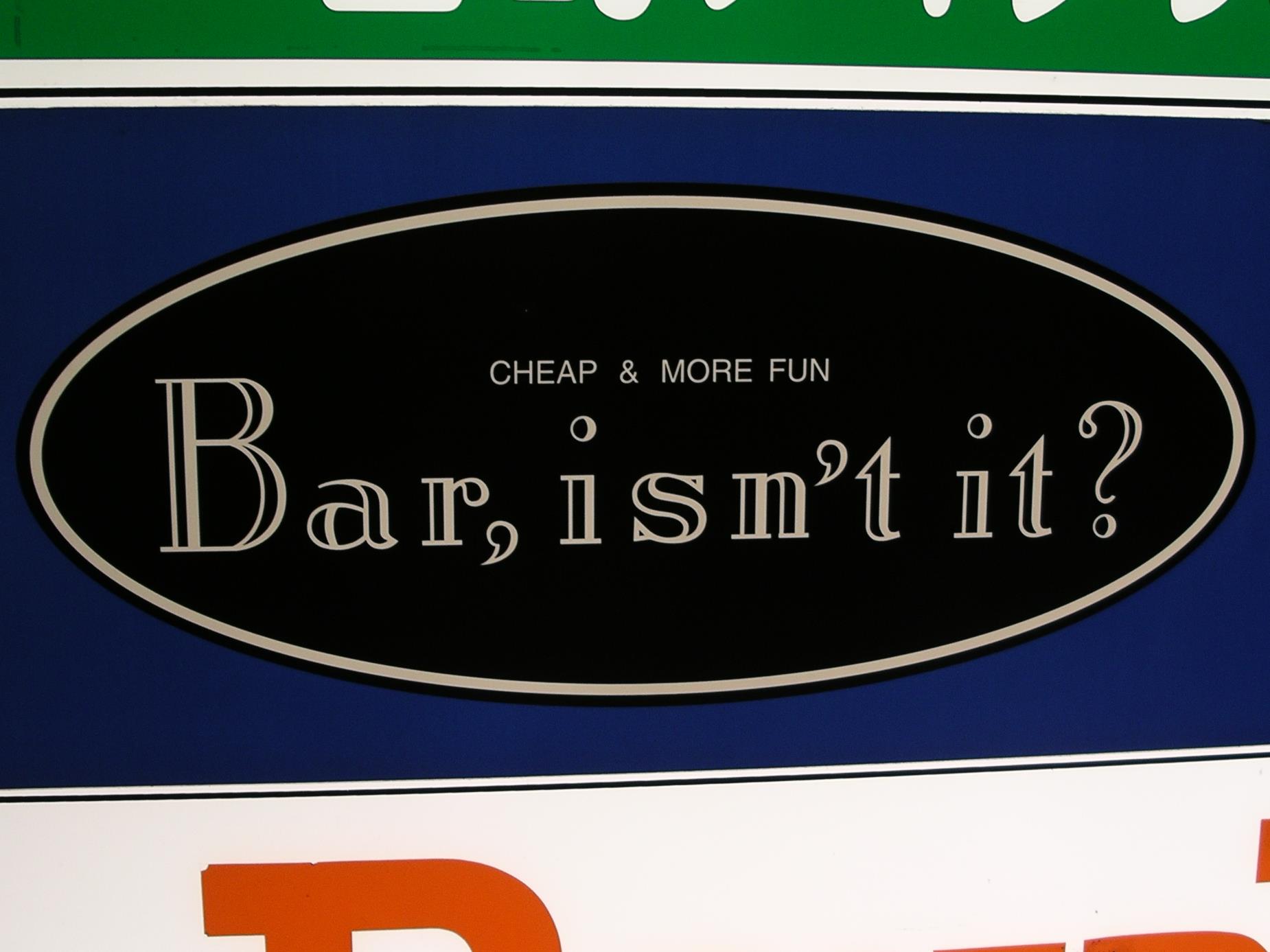

|
I'm no businessperson, but it seems to me that the name of your establishment should answer more questions than it raises:
 We've experienced karaoke in Japan enough times now to think that it's substantively different from karaoke in America. In America, it seems that people usually do it as an ironic or goofy thing. Here, it's a sincere form of entertainment. Or possibly sport ¡½ people practice, and some systems have scoring based on rhythm and pitch. Most of our Japanese friends do quite well, scoring in the 75% - 90% range. We're not that good; maybe we need more practice within our respective repertoires (Matthew prefers punk and rock; my specialties are Britpop and Songs Clay Aiken Performed on American Idol.). Or maybe we need repertoires of Japanese songs to be competitive.
Karaoke isn't just a competition, it's also a workout. At the end of each song, some systems tell you the number of calories burned performing it. We're not sure how accurate the calorie count is, though. For example, one system claims that a midtempo Japanese enka song uses more energy than the Offspring's "Why Don't You Get A Job?" On the other hand, it's good to know that karaoke has health benefits beyond making one's life a bit happier, and since I can't Jazzercise in Kitakami, maybe it's the next best thing. A few weeks ago, our friendly local liquor store owner / school landlord invited us to take a tour and tasting at a local sake brewery, Kikuzakari. It's a small brewery that has been in the same family for generations. The current president is the founder's great-great grandson, and he took us on the tour personally.
One thing that's obvious when you tour a sake brewery is that OSHA holds no sway here. Workplace safety is your own lookout. Even customers taking a tour are expected to look out for themselves, walking about in poor lighting on wet floors, stepping over the hoses and wires strewn everywhere.  Of course, it was well worth it just to get to spend time surrounded by the yummy yeasty smell of brewing alcohol. It was heavenly. At one point we got to try the somewhat sweet and tart raw sake from a vat that was just about ready for filtering and bottling. Being a small brewery, many tasks that would be done by machine at a large brewery are done by hand. The day we were there, this guy was gluing the labels to the bottles. It's not a very exciting job — grab a crate, wipe all the bottles clean, spread glue on a label, carefully line it up and press it in place, move on to the next bottle — but I guess somebody has to do it. 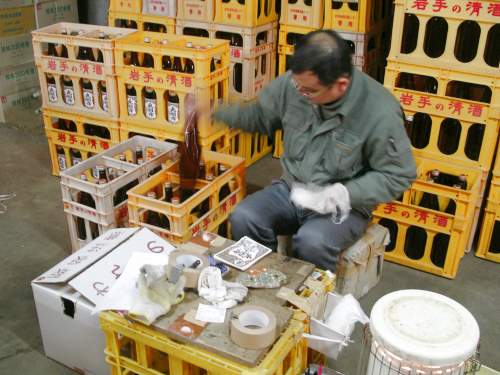 One of my childhood neighbors died recently, giving me occasion to go shopping for a sympathy card. I stood at the very small greeting card display in our local stationery store for a good while before I concluded that they had no sympathy cards. Not that they had run out, but that they simply didn't carry them. Prior to then, it hadn't occurred to me that the Japanese wouldn't send sympathy cards upon someone's death, but that appeared to be the case. I asked some of my students about it later, and was quite surprised by their answer. We've never heard of sympathy cards, they said. We send telegrams when people die.
Telegrams? The things Western Union stopped sending about two years ago because technology had rendered them obsolete? As it turns out, telegrams are used frequently in Japan to acknowledge major life events. Deaths, births, marriages, retirements ¡½ all are occasions for telegrams. You can even choose special papers for your messages or stuffed animals to accompany them. And, ironically, you can order them on the internet. It's always amusing to see English — and made-up "English" words — in Japanese brand names and advertising. They mean well, but often miss the connotations of the English they choose.
For example, there is a line of car accessories called "Blang". My reaction? "Past tense? What is that, like last year's style?" It's actually a pretty neat word, but alas, I was not the first to think of it. Parking in Japan (well, in Kitakami anyway) is an interesting thing. There are lots and garages, of course, but these seem to be mostly used for daily parking or at shopping centers. There aren't meters anywhere, which sort of makes sense if you consider that streets here are quite narrow ¡½ why invite people to clog the space available for traffic to flow? The lack of meters isn't a deterrent, though. It's common practice to simply pull over to the curb and leave your car there while you run into the store to take care of business. Everyone just drives around you.
For someone used to restrictions on on-street parking, this just seems kind of wrong. In fact, I avoided doing it for the first couple of months that we had the car because I felt like kind of a jerk doing it. "I'm just leaving my car here in the road while I get the dry cleaning! Yes, I know the road is one-and-a-half lanes wide, but just go around!" Now that I'm used to it, I kind of like it. Everyone knows that's what you do, so no one's trying to run you over, giving you the stinkeye, and/or honking at you. And it's nice to be able to stash the car and run a quick errand without hunting for parking. The random car-leaving is especially interesting in light of the fact that to even own a car in Japan, you must prove that you have a place to park it. You have to tell the dealer where your space is, then he has to provide details about the space, like location, to the police so that they can verify that it is, in fact, your space. Only then can you actually buy the car. So, once you've proven that you have a place to park your car, you can . . . park it anywhere you like. What could possibly say "Happy Valentine's Day" better than two cans of beer?
How about two cans of beer decorated with a ribbon and a rhinestone heart? 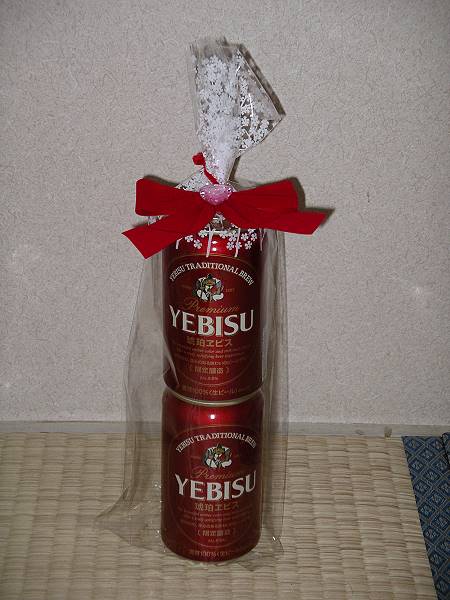 Yesterday was Setsubun, the day before the beginning of the "spring season" in Japan. Setsubun is a day akin to New Year's, when people engage in rituals to chase evil away from their homes and bring good fortune in during the year. The most famous ritual is mamemaki, or "bean throwing." Mamemaki involves the head of the household throwing beans out the door of the home at someone dressed as a demon, while the family members chant: "Oni wa soto! Fuku wa uchi!" ("Demons out! Good luck in!"). You're also supposed to eat one bean for each year of your life to bring good luck. Here in Kitakami, stores were selling peanuts to be used for mamemaki, rather than soybeans.
We didn't do mamemaki at home (scaring demons away is why we have big fuzzy dogs), but we did partake in the ritual of eating ehomaki at Hige-oyaji's place. This tradition allegedly originated in the Kansai region, but has spread to other areas of Japan. Ehomaki is a fat sushi roll (called futomaki on non-Setsubun days). If you can eat the entire uncut roll while praying, and without speaking, it is believed that you will have good fortune throughout the year. You eat the ehomaki while facing the eho (direction of good fortune) for the year. The eho is determined by the year of the Chinese zodiac; this year, for the year of the mouse, the direction was south-southeast. Hige-oyaji had a fancy Setsubun compass, set with zodiac symbols and their related directions, to tell us what direction to face. Unfortunately, I didn't completely understand what was going on, so I ate most of my ehomaki facing a wrong direction. Oops. On Sunday, we went bowling as part of a group event. Bowling in Japan is no different from bowling in the States, down to the clownish rental shoes.
 We haven't gone bowling in a very long time, so it took us a few frames to get back into it. Our team actually did pretty well ¡½ three of us broke 100 on the first game, and we all did on the second. The event was a fundraiser for the local sign language club, some of whom we've met through local friends. In between turns, they were teaching us little bits of Japanese Sign Language, including the signs for "Washington" and "America." As it turns out, the frowny face accompanying a blown spare is an international sign. At the end of the tournament, the group gave prizes to each participant, ranked from highest score to lowest; I think we were all in the top twenty. Also, people who threw gutter balls had the dubious distinction of getting extra prizes based on the number of gutters thrown. Matthew got one: 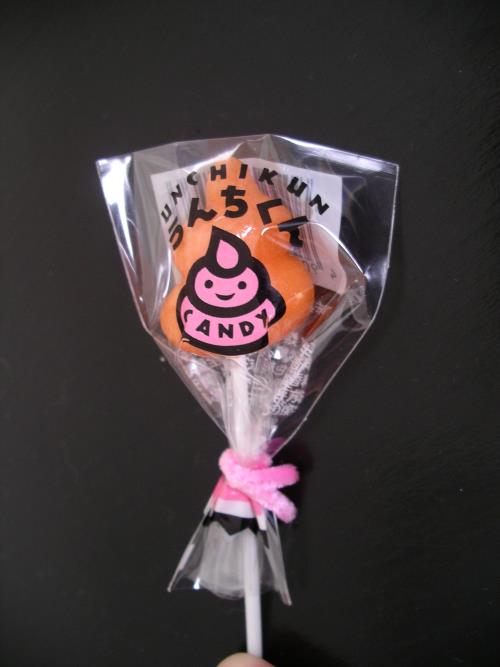 Yes, it's candy poop on a stick. A lollipoop, if you will. You can find almost anything your heart desires in vending machines in Japan: soda, beer, hot canned soup, 10-kilo bags of rice. . .
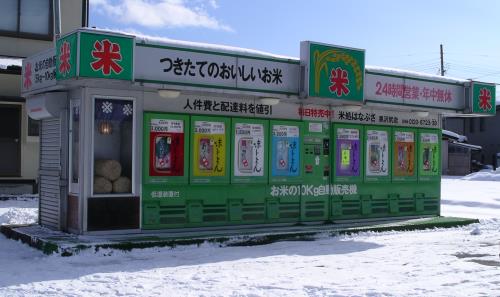 This machine has gotten some play before, courtesy of the late, great, Kitakami Photoblog (Konnichiwa, Julia-san!). Back Next |